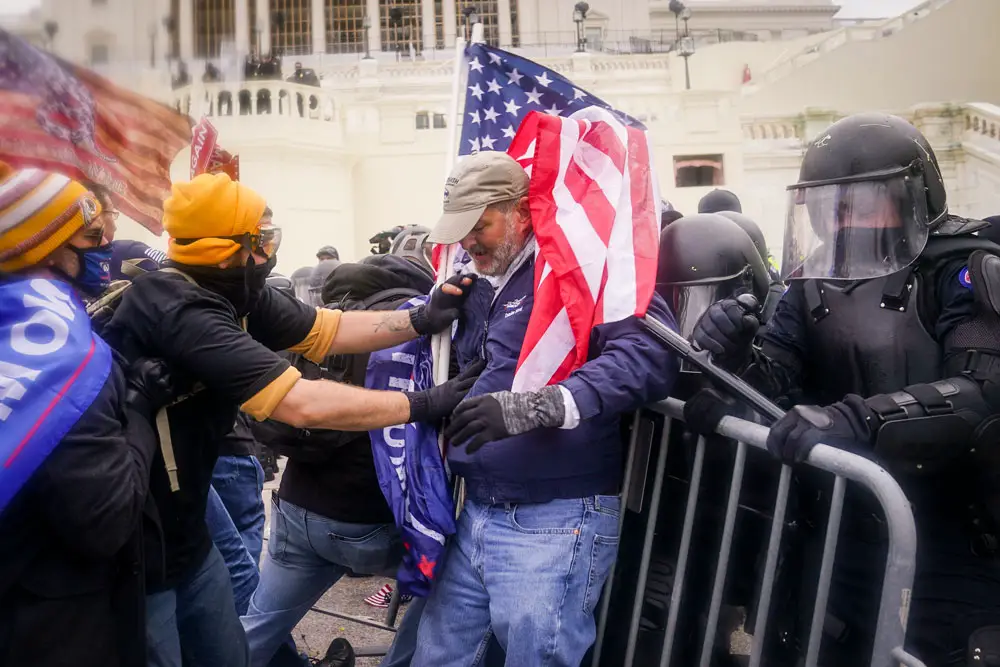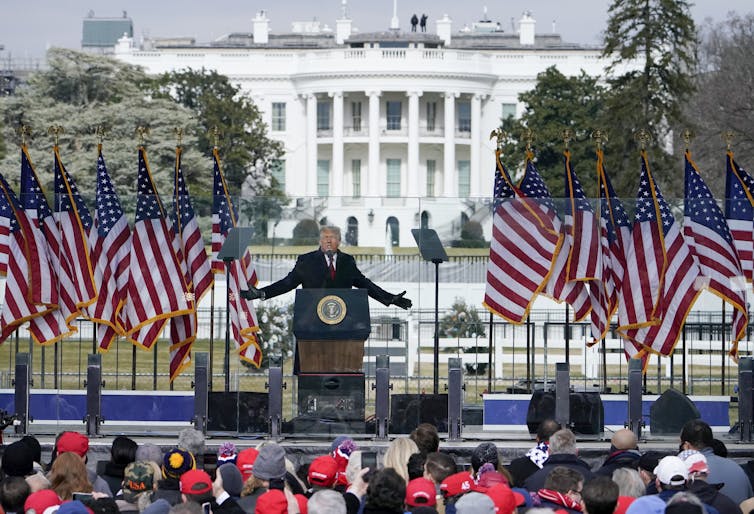
By Jennifer Mercieca and Timothy J. Shaffer
When the governing body of the Republican Party called the events of Jan. 6, 2021, “legitimate public discourse,” it renewed a sometimes-furious debate about what are, and aren’t, acceptable forms of discussion and debate in a democratic society.
This question has emerged frequently in recent years, with complaints about inappropriate methods of protest, efforts to take particular viewpoints off social media, and accusations that various people are disseminating misleading information. But the issue took on new urgency on Feb. 4, 2022, when the Republican National Committee censured U.S. Reps. Liz Cheney of Wyoming and Adam Kinzinger of Illinois.
They are the only Republicans serving on the House Select Committee to Investigate the January 6th Attack on the United States Capitol. The governing body of the Republican Party said this meant they were “participating in a Democrat-led persecution of ordinary citizens engaged in legitimate political discourse.”
As researchers who study the relationship between communication and democracy, we believe our insights can help citizens draw the line between “legitimate political discourse” and illegitimate political violence.
There are legal standards defining protected speech, but something that meets the legal definitions may not necessarily help build and maintain democracy. Scholarly definitions of the types of speech that are beneficial for democracy help make the issues clearer.
Persuasion, not coercion
Put most simply, speech that is designed to teach people about other viewpoints and persuade them to change their minds – rather than pressuring them to take different actions – is good for democracy.
The key, as pointed out by communication scholar Daniel O’Keefe, is that the audience has “some measure of freedom” about receiving the message and choosing how to act upon it.
Persuasion, even in its most vigorous and aggressive form, is an invitation. When a person seeks to persuade someone else to agree with their viewpoint or values, or to recall or ignore history in a particular way, the recipient may choose to go along, or not.
Coercion, on the other hand, is a kind of force – a command, not an invitation. Coercion denies others the freedom to choose for themselves whether to agree or disagree. Coercion and violence are anti-democratic because they deny others their ability to consent. Violence and coercion are the very opposite of legitimate political discourse.
Politics is not war, and legitimate political discourse is not violence.
What about protest?
Protests can take many forms. In their most democratic form, political scientist Mary Scudder notes that protests “can improve the deliberativeness of a political system by putting important problems on the agenda or introducing new arguments into the public sphere.” Protest helps people to be aware of the views held by others, even if different groups disagree vehemently.
In the name of democracy, scholars of communication, free speech and deliberation have said protesters deserve to be heard and given as much latitude as possible to communicate with the public. In part, that is because protesters may represent underprivileged or mistreated people whose messages may be hard for powerful interests to hear.
But impassioned protest can sometimes seem like an attempt at coercion, especially for people who feel targeted by the protesters’ messages.
Persuasion and coercion on Jan. 6
The Republican National Committee would like Americans to focus on the peaceful protesters who gathered on Jan. 6, 2021, to hear President Donald Trump’s speech at the Ellipse – and ignore the violence at the Capitol.
If we look at the Ellipse, we see a vibrant, and legitimate, political protest with signs, chants and speeches. If we look at the Capitol, by contrast, we see illegitimate political violence, including people using bear spray, erecting a hangman’s noose and assaulting others.
The link between them was Trump’s speech. He used a particular combination of rhetorical strategies, calling for a plague to be removed so that the nation could be pure again; threatening force; and claiming that his group was good, strong, pure and sure of victory. He also made claims of victimhood, of having had something stolen from him and his supporters. This specific combination of rhetorical strategies has traditionally been used to motivate a nation for war.

AP Photo/Jacquelyn Martin
That type of communication from a president can be legitimate political discourse when used to motivate a nation to war against another nation, though there have certainly been circumstances in American history in which that power has been abused. But when the president uses that rhetoric against the democratic process in his own government in order to retain power, it is not legitimate political discourse. Rather, as scholars of authoritarianism have explained, using war rhetoric against your own nation amounts to an “autogolpe,” or “self-coup.”
When Trump urged the Ellipse crowd to march to the Capitol and “fight like hell,” his words transformed an occasion of legitimate political discourse into an anti-democratic violent insurrection.
The result was real physical violence, characterized by Capitol Police Sgt. Aquilino Gonell, a 42-year-old veteran of the war in Iraq, as a “medieval battle.” Several people died and many were injured.
American democracy was damaged as well. Lisa Murkowski, a Republican U.S. senator from Alaska, called the Republican National Committee’s characterization “false” and “wrong,” saying on Feb. 5, 2022, that the events at the Capitol were “an effort to overturn a lawful election.”
Democracy isn’t a game. To respond with appropriate seriousness, Americans can’t frame moments such as Jan. 6 simply as a “competition between left versus right, Democrat versus Republican; a battle of individuals and political factions,” writes communications scholar Dannagal Young. Those violent, coercive events are challenges to the real heart of democracy: peaceful persuasion and the rule of law.
Looking at the entirety of what occurred on Jan. 6, 2021, it’s clear that there was both legitimate protest and illegitimate political violence. When political violence replaces political discourse, and when political leaders refuse to play by the democratic rules of the game, democracies weaken, and may even die.
![]()
Jennifer Mercieca is Professor of Communication at Texas A&M University and Timothy J. Shaffer is Associate professor at Kansas State University.





























marlee says
It took over a year to understand that?????!
makeitso1701 says
These animals that attacked the Capital on January 6 are domestic terrorist. Talk about the most un-American, un-Patriotic thing to do, these cult followers did.
LOCK THEM UP, LOCK THEM UP
Steve says
They were Tourists visiting a Gift Shop Patriots One and All…
JimBob says
The January 6 insurrectionists are made up of the same trash that appears episodically milling around Veterans Park and blathering at Flagler school board meetings.
Deborah Coffey says
Best guess…Trump, too, will be in prison long before 2024.
Christopher Todd Lemke says
The truckers’ convoys will be the keys to change in the US. They have real leverage and nothing can stop them. How about if we stop deliveries to the counties surrounding DC for starters?
The Canadians have outsmarted us. We learn quickly, however. And so it goes with the rest of the world. Trudeau is a textbook example of the kind of pathetic wimp the left seems to adore. Same goes for the US. I am looking forward to seeing the US politicians licking the boots of our truckers. Nothing can stop this.
Has anybody seen Ray Epps lately?